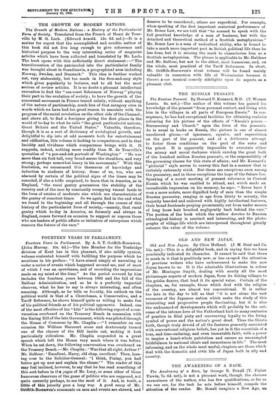FOURTEEN YEARS IN PARLIAMENT.
Fourteen Years in Parliament. By A. S. T. Griffith-Boseawen. (John Murray. 103. 6d.)—The late Member for the Tonbridge division of Kent has in this pleasant, if also mildly cynical, volume contented himself with fulfilling the purpose which he mentions in his preface : "I have aimed simply at narrating in order a series of events which happened around me, and of most of which I was an eyewitness, and of recording the impressions made on my mind at the time." As the period covered by him includes the fourteen years between 1892 and the fall of the Balfour Administration, and as he is a perfectly impartial observer, what he has to say is always interesting, and often amusing. Although, as he tells us frankly, his outlook on the political world is that of a Churchman, a Conservative, and a Tariff Reformer, he shows himself quite as willing to make fun of his political friends as of his political opponents. Indeed, one of the most effective of his " hits " is the following report of a con- versation overheard on the Treasury Bench in connexion with the Rating Bill of the late Government, which was piloted through the House of Commons by Mr. Chaplin :—"I remember on one occasion Sir William Harcourt arose and dexterously turned one of the clauses of the Bill inside out, making it look particularly ridiculous. Mr. Chaplin responded in a great speech which left the House very much where it was before. When he sat down, the following conversation was overheard on the Treasury Bench ;—Mr. Chaplin : Was that all right, Arthur ? ' Mr. Balfour : Excellent, Harry, old chap, excellent.' Then, lean- ing over to the Solicitor-General: 'I think, Finlay, you had better get up now and explain the clause.' " The reader of this may feel inclined, however, to say that he has read something of this sort before in tke pages of Mr. Lucy, or some other of those humorous observers of the game of politics who are supposed, not quite correctly perhaps, to see the most of it. And, in truth, a little of this jocosity goes a long way. A good many of Mr. tkriffith-Boscawen's comments on men and events are shrewd, and deserve to be considered ; others are superficial. For example, when speaking of the first important oratorical performance of Mr. Bonar Law, we are told that "he seemed to speak with the full practical knowledge of a man of business, but with the detached and theoretical method of a Scottish metaphysician." Mr. Boner Law is a man of undoubted ability, who is bound to take a much more important part in British political life than he has done, but it is missing the mark to characterise him as a Scottish metaphysician. The phrase is applicable to Mr. Haldane and Mr. Balfour, but not to the ablest, most humorous, and, on the whole, most practical of the Tariff Reformers. In short, Mr. Griffith-Boseawen's stout volume will be found mainly valuable in connexion with life at Westminster because it throws a mile musical comedy sidelights upon its aspects as a pleasant club.




















































 Previous page
Previous page